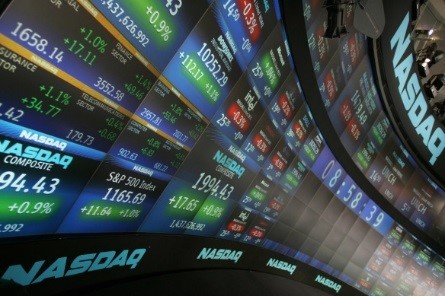Quants The Rocket Scientists Of Wall Street_5
Post on: 16 Март, 2015 No Comment

For the uninitiated, financial writing can sometimes sound like science fiction. Take this sentence from “The Quants,” a new book by the Wall Street Journal reporter Scott Patterson: “To the quants, beta is bad, alpha is good.” Out of context, that could easily be mistaken for dialogue from the “Star Trek” franchise.
In fact, the quants are the protagonists of Patterson’s gripping tale; experts in mathematics, physics and computer science who brought sophisticated quantitative approaches to the world of Wall Street. The number-crunching techniques of the quants promised something better than beta. which is “shorthand for plain-vanilla market returns anyone with half a brain can achieve,” in Patterson’s words. If you can deliver a return that surpasses the benchmark indexes, you’ve achieved alpha — and with it, the “ephemeral promise of vast riches.”
Related Coverage
Times Topic: On Language
In the pursuit of alpha, the quants managed to reshape the financial markets by relying on computerized algorithms to generate huge gains for investors. But with the unfolding economic crisis of 2007 and beyond, the alpha dogs ended up in the doghouse.
Regardless of how much blame the quants deserve for the current economic mess, their impact has been undeniable. From the early ’70s, math-minded academics began moving to Wall Street, designing complex models to assess risk and predict market movements. On their arrival, they were often called “rocket scientists” by traditional traders, a term of derision that belittled their lack of down-in-the-trenches business know-how. (Think of folksy disclaimers like “I’m no rocket scientist, but. ” or “It’s not rocket science!”)
Quants then emerged as the new word for Wall Street’s rocket scientists. It had long been a scholastic shortening for “quantitative,” defined as early as 1896 in a glossary of student slang as “quantitative analysis or quantitative chemistry.” In its financial application, the word could refer either to the analysis or to those who conducted it. In 1979, Forbes magazine characterized quants as “the young consultants who do much of their monitoring by questionnaire and most of their evaluating by quantitative analysis.” That same year, in “The Dow Jones-Irwin Guide to Modern Portfolio Theory,” Robert Hagin offered some “new words”: “quants (those who apply quantitative investment techniques), superquants, pseudoquants and even turncoat-quants.”
The big quant boom began in the mid-’80s, when investment firms started attracting venerable names like Emanuel Derman, a South African-born physicist described by Patterson as an “überquant,” who eventually became a managing director at Goldman Sachs. When I asked Derman recently about his early years in finance, he said that at first he felt that quant. like rocket scientist before it, was largely a derogatory put-down for the brainy newcomers, many of them foreign-born: “two-thirds pejorative, one-third grudging praise,” by his calculation. Another popular epithet from the era was quant jock. on the model of other eggheaded jock compounds like math jock or computer jock .
Quant was still new enough in 1986 that its origin stumped William Safire, who surmised that it was an abbreviation of “quantum jump.” But soon there were quant funds (investment funds with securities selected by quantitative analysis) and quant firms (firms specializing in quantitative investment). Wall Street recruiters scoured the top tech schools for all manner of quants. As described by Mark Joshi, a former quant at the Royal Bank of Scotland, in his paper “On Becoming a Quant,” subspecies include desk quants. a k a front-office quants. who work directly with traders, and statistical-arbitrage quants (stat-arb quants for short), who plow through mounds of data to find opportunities for automated trading.
As quantdom grew more glamorous in the ’90s — and as nerdhood in general became more firmly entrenched in the business world during the dot-com boom — any lingering ridicule behind quant faded away. Derman proudly identified with the Q-word in the title of his 2004 memoir, “My Life as a Quant,” and 25 financial analysts reminisced about their roots in the collection “How I Became a Quant,” published in 2007. Reviewing the latter book in The Wall Street Journal, Derman wrote that quant had become more all-encompassing, noting that several of the contributors were in his estimation “not true quants” steeped in advanced university research but instead were simply quantitative in their investment approaches.
The geeky glamour of the quant took a big hit with the financial downturn, beginning with the so-called quant crisis in the summer of 2007, when quant funds took a nosedive. “All I can say is, beware of geeks bearing formulas,” Warren Buffett memorably told Charlie Rose in October 2008. But The Times reported last year that student interest in the quant career track remains strong, as demonstrated by the standing-room-only attendance at a workshop at M.I.T. called “So You Want to Be a Quant.”
Despite hand-wringing over the failure of the quants, neither the term nor the type of financial analysis it designates is in danger of disappearing, according to David Leinweber, author of “Nerds on Wall Street” and the founding director of the Center for Innovative Financial Technology at the University of California, Berkeley. “As long as there’s data and money, there will be quants,” Leinweber recently told me. And as the markets move increasingly toward computer-driven, high-frequency trading, with exchanges made by the millisecond, the enduring influence of the quants will remain vast — maybe even unquantifiable.
Ben Zimmer will answer one reader question every other week. Send your queries to onlanguage@nytimes.com .
A version of this article appears in print on May 16, 2010, on page MM16 of the Sunday Magazine with the headline: Quants. Today’s Paper | Subscribe














